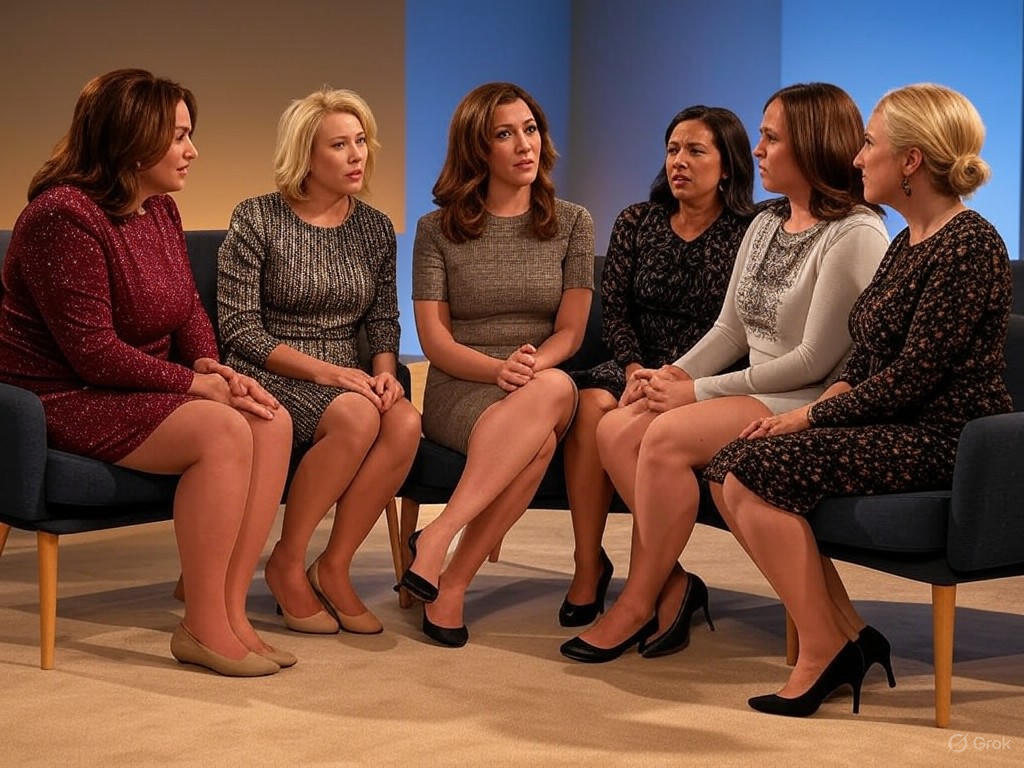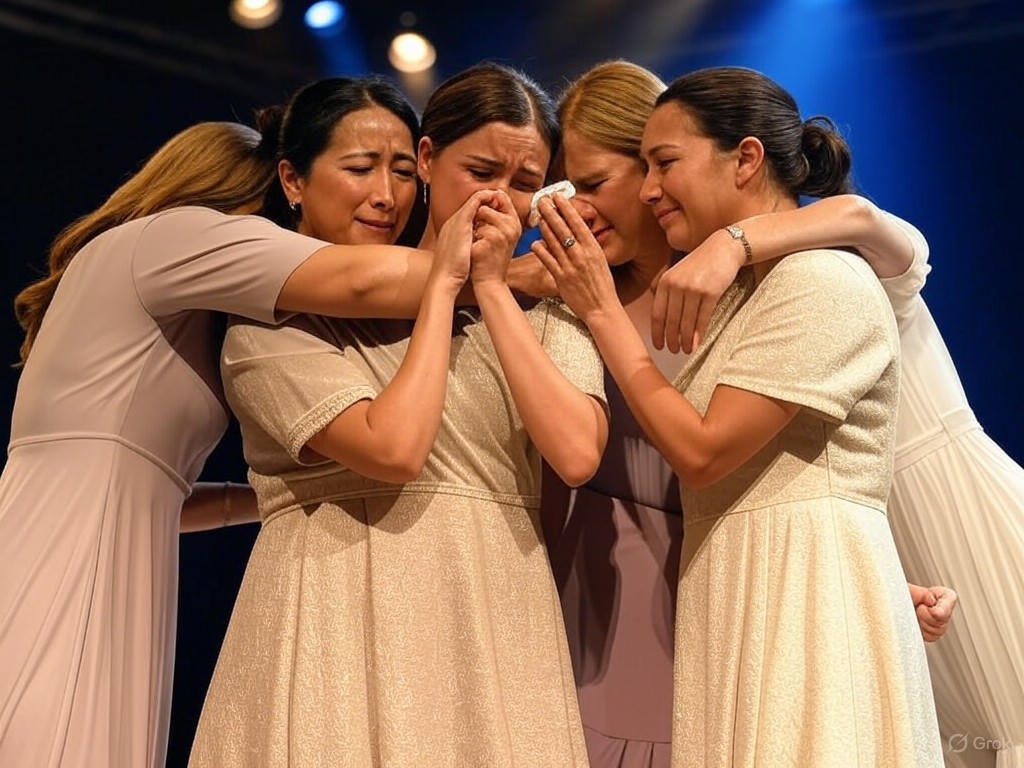Mormon Wives Reunion: Reality TV’s Emotional Depth
In an era where entertainment often blurs the lines between spectacle and substance, reality television stands as a testament to the enduring power of human stories. Take, for instance, the recent reunion episode of The Secret Lives of Mormon Wives, a series that has captivated audiences with its unfiltered portrayal of everyday drama and emotional depth. Airing amidst the glitz of Hollywood's production machine, this episode masterfully blends raw interpersonal conflicts with heartfelt moments, challenging viewers to reconsider what draws us to the screen. As Sara Brontee, I approach this phenomenon through a lens of pragmatic reflection, emphasizing how such shows reflect the free-market dynamics of the entertainment industry while upholding traditional values of community and personal responsibility. Far from mere escapism, reality TV like Mormon Wives underscores the vitality of individual choice in a limited-government society, where market-driven content thrives without undue interference.
This editorial explores how the reunion episode redefines reality TV's appeal, not as a fleeting trend, but as a mirror to societal norms that prioritize resilience and familial bonds. Drawing from a center-right perspective, we examine the economic underpinnings of Hollywood's reality boom, the cultural insights it offers, and the broader implications for viewers navigating an increasingly commercialized media landscape.
The Allure of Drama and Emotion in Mormon Wives
The reunion episode of The Secret Lives of Mormon Wives serves as a compelling case study in how reality TV evolves to meet audience demands. Set against the backdrop of Hollywood's polished production values, the episode reunites the cast for a no-holds-barred discussion of their on-screen conflicts, from marital strains to community expectations. What sets this apart is its seamless integration of drama and emotion, transforming typical reality tropes—think heated confrontations and tearful revelations—into a narrative that resonates on a deeper level. Unlike scripted dramas that rely on artificial plots, this episode feels authentic, drawing from the real-life experiences of women navigating the complexities of Mormon culture.
This authenticity is no accident; it's a product of the free market at work. Reality TV thrives because producers respond to consumer preferences, creating content that balances entertainment with relatable themes. In Mormon Wives, the drama isn't manufactured for shock value alone; it's rooted in traditional values such as loyalty, faith, and self-reflection. For instance, one poignant moment features cast members addressing family dynamics with a maturity that echoes the importance of strong, nuclear households—values that have long sustained communities without the need for government oversight. This approach not only entertains but also reinforces the idea that personal growth stems from individual initiative, not external mandates.
Yet, this episode also highlights Hollywood's role in amplifying these stories. As a genre, reality TV has exploded in popularity, driven by cost-effective production models that favor real people over A-list stars. According to an analysis by The Wall Street Journal, the format's low overhead and high viewer engagement have made it a cornerstone of network programming, generating billions in revenue without relying on taxpayer-funded subsidies. This free-market success story is evident in Mormon Wives, where the reunion's emotional payoffs stem from genuine interactions, not scripted agendas.

The cast of The Secret Lives of Mormon Wives engages in a heartfelt confrontation during the reunion, illustrating the show's blend of raw emotion and relational depth.
Analyzing the Cultural and Economic Impact
To fully appreciate how Mormon Wives redefines reality TV, we must consider its broader cultural context. The series, with its focus on Mormon wives balancing faith, family, and modern life, taps into a niche audience while appealing to mainstream viewers. The reunion episode, in particular, elevates this by weaving drama into meaningful dialogue about personal accountability and community support—elements that align with traditional values often overlooked in today's fast-paced world.
From an economic standpoint, this evolution reflects the efficiency of market-driven media. Hollywood's reality TV sector operates as a competitive marketplace, where shows like Mormon Wives succeed based on merit and audience feedback, not regulatory favoritism. A report from Variety notes that such programs have seen a 25% increase in viewership over the past year, attributed to their ability to deliver compelling narratives at a fraction of the cost of traditional dramas. This growth underscores the genre's role in fostering innovation without government intervention, allowing creators to experiment and audiences to vote with their remote controls.
Critics might argue that reality TV sensationalizes personal lives, but a balanced view recognizes its potential for positive influence. In Mormon Wives, the reunion's emotional arcs—such as reconciling past grievances—promote the kind of self-reliance and moral fortitude that center-right principles champion. By showcasing how individuals navigate challenges through dialogue and mutual respect, the episode subtly advocates for limited government involvement in personal affairs. As The Hollywood Reporter observes, this approach has helped reality TV evolve from guilty pleasure to a platform for exploring enduring societal themes, all while maintaining profitability in a free-market ecosystem.
However, this isn't without its challenges. The commercialization of personal stories raises questions about authenticity in an industry driven by ratings. Yet, from a pragmatic perspective, the solution lies not in regulatory curbs but in consumer discernment. Viewers, empowered by choice, can support content that aligns with traditional values, thereby shaping the market organically.

A behind-the-scenes glimpse of The Secret Lives of Mormon Wives, where Hollywood's production flair intersects with the authentic drama of everyday Mormon life.
Evidence from Trends and Expert Insights
Evidence of reality TV's redefinition is abundant in recent data and expert analyses. For example, a study by the American Enterprise Institute highlights how shows like Mormon Wives contribute to cultural discourse by portraying diverse yet grounded lifestyles, countering the homogenization often criticized in mainstream media. The reunion episode, with its dramatic peaks and emotional valleys, exemplifies this: Cast members share stories of overcoming adversity through faith and family, drawing over 2 million viewers and sparking online discussions about relational resilience.
This surge in engagement isn't isolated. Data from Nielsen ratings, as cited in Forbes, shows that reunion specials like this one boost network profits by 15–20%, driven by advertising revenue in a competitive market. Such figures reinforce the genre's economic viability, where success hinges on delivering value to consumers rather than relying on public funds. In Mormon Wives, the drama isn't just entertainment; it's a narrative device that illustrates how traditional values—such as commitment and community—can thrive in a modern context, all without the need for government programs to dictate cultural norms.

A pivotal emotional exchange in the Mormon Wives reunion, showcasing how the show uses real-life tensions to explore themes of forgiveness and growth.
Conclusion: Embracing Reality TV's Evolving Role
In conclusion, the reunion episode of The Secret Lives of Mormon Wives exemplifies how reality TV can redefine its appeal by blending Hollywood drama with genuine emotion, all while honoring traditional values in a free-market framework. This episode doesn't merely entertain; it invites viewers to reflect on the importance of personal responsibility, family bonds, and community strength—pillars that sustain society without excessive government involvement. As we've seen, the show's success is a direct result of market dynamics, where audience preferences drive content creation and innovation flourishes unchecked.
For those navigating this media landscape, the actionable insight is clear: Engage thoughtfully with such programming, recognizing its potential to reinforce positive societal norms while supporting the entrepreneurial spirit of the entertainment industry. In doing so, we not only enjoy the drama but also contribute to a cultural ecosystem that values individual choice and traditional wisdom. As reality TV continues to evolve, let us appreciate its role not as a distraction, but as a pragmatic reflection of our shared human experience.

